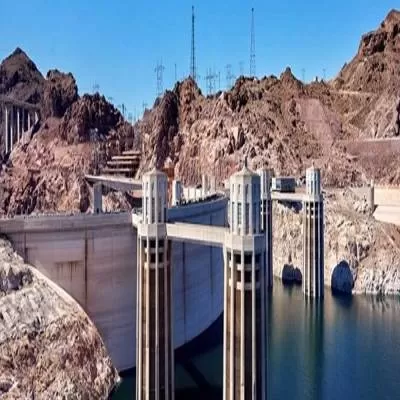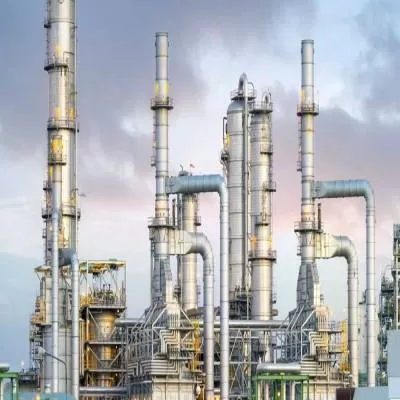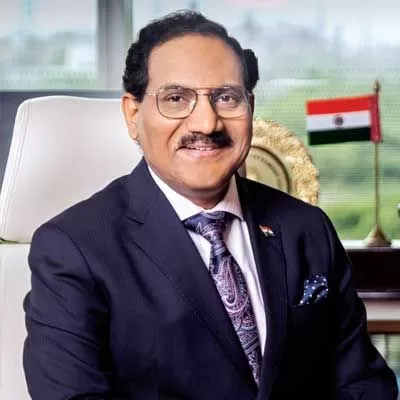- Home
- Infrastructure Energy
- POWER & RENEWABLE ENERGY
- Hereon, contracting will not be limited to just power projects
Hereon, contracting will not be limited to just power projects
This is not just a contractor but an all-rounder. From the beginning of its journey in 1960, National Buildings Construction Corporation Ltd (NBCC), a Government of India enterprise, has managed to reach out to several areas within the construction sector, like real estate, power plants, sewerage treatment, roads, bridges, airports, and more. Backed by over 29 years of experience in the power sector and an association with NBCC since 2006, Vishnu P Das, the company’s Chairman and Managing Director, is at the vanguard of NBCC’s forward march. He shares more about the company, its strategies and the industry as a whole in conversation with Shriyal Sethumadhavan.
On the growth trajectory: Having been involved in power projects for the past 25 years, NBCC has been a leader in chimneys and cooling towers; our scope of work executed includes main power plant civil works, civil works for cooling tower, coal and ash handling. However, with increasing competition, bagging contracts has become a challenge, although we continue to look for opportunities here. Further, we have executed several roads and bridges, not just in India but in Iraq too. In the past five years, though, we have not undertaken any bridge projects as it is difficult to bag new contracts in a typical Indian scenario unless you have completed such projects in the recent past. Our landmark bridge projects as contractors include one in Kolkata towards Rajarhat and another one in Delhi towards Rohini, and we continue to explore openings through a JV or partnership. In addition, we have constructed airports in Assam, Patna, Bhubaneshwar, and so on, with Mysore airport being our most recent airport project. As for the roads sector, we are essentially working on the Pradhan Mantri Gram Sadak Yojana for which we have already completed more than Rs 2,500 crore of works. Currently, NBCC is constructing the National Centre for Disease Control for Ministry of Health and will be involved in the project management. We will start this October, and execution time is estimated to be around two years.
Quoting it right: Generally, the aim is to be the lowest bidder. Unfortunately, this leads to most contractors quoting at unworkable rates, which eventually leads to financial crises. This is the outcome of aggressive bidding. The issue is that in most contracting agencies, there are separate departments for marketing and project execution. The marketing team benefits when they get the job, but the execution team finds it difficult to execute at such low rates. An ideal solution would be appropriate selection of parties for execution. Today, even renowned players are struggling for power plant contracts, because these companies maintain their work quality and hence cannot quote below a certain rate.
The policy level: India’s infrastructure has great potential as most towns and villages still suffer from issues of water and power supply and lack of sewerage. Today, there is a need for production as well as labour force to reach the market from villages; in short, we require an influx from rural to urban India. This will happen gradually. For the country, it is in the hands of policy makers to decide on expansion modes. Today, the main issue in power projects is the shortage of coal. As a strong focus has led to the development of several power stations, the coal industry is lagging behind. So, such issues should be considered at the policy level. The need of the hour is inclusive and integrated growth; the entire industry’s canvas should be considered for this.
The drill: To ensure timely completion of projects with close monitoring, selection of the right agency is crucial. For NBCC, being a government agency, there are set rules, procedures and guidelines to be followed. Nowadays, we have also started e-tendering and pre-qualification, before which we monitor the financial strength of the contractors. Further, regular follow-ups are required with the release of payment as cash flow is the basic obligation for any construction work. What’s more, safety and security should be created for labourers and the entire staff involved in the project. These apart, one major issue that leads to project delays today is clearance. For power projects, the biggest requirement is environment clearance, which takes not less than a year and at times two years. All these issues must be addressed with a joint solution.
Facilitating excellence: Today, in India, another major reason for project delays is the lack of skilled workers. There are engineering colleges and polytechnics, but there are very few institutions to train labourers. This matter should be taken up at the policy level, and labourers should be trained as welders, carpenters, brick layers, etc. Like in the olden days, in the present day too, the guru teaches his disciples. I do not deny that efforts are being taken in this direction, but we need more training schools on a much larger scale, considering the population of India. We also conduct training processes and have maintained a training calendar for our people. This has become an annual curriculum.
The PPP way: The public-private partnership (PPP) model works well for roads and best for toll bridges. For instance, in 1986 the Delhi-Noida-Delhi Bridge used to be vacant compared to the crowd seen today. However, over time, such projects have become viable with contractors earning money and the government benefiting too. If you travel from Delhi to Chandigarh, you will pass by at least four to five toll bridges; because the rates are based on the length of the stretch, they become viable. However, this mode might not work for power projects because it is a very complex subject. Not many partners in this sector will come forward to do a job in PPP; it has to be done on an ownership basis or maybe a listed company would do it.
India calling: In the power sector, the rule book says that any work undertaken by the contractor has to be completed at any cost; else the power station will not be commissioned. This, clearly, can amount to national loss. Hence, as chairman, I consider this a moral duty; even in terms of quoting, I never quote beyond a point just to bag the contract.
Another imperative is to adopt green energy. We cannot continue burning coal to generate power and overlook environmental issues. But here again, the key problem lies in the generation of ash. Generated far away from the mainland, the transportation cost is very high. The government should make the usage of ash in power plants compulsory. However, considering high transportation costs, this material should be made available at cheaper rates or maybe free of cost. In addition, pollutants like high fuel oil (HFO) should be reclaimed, reused and recycled, and any solid waste regenerated needs to be reused.
Flying high: We have executed several projects overseas; unlike today, earlier all our projects in Turkey, Iraq, Libya, etc, were executed only in the contracting segment. Before we bid for projects, a complete recce is done to understand the local area, its people, rates, availability of material, engineers, etc. At present, we are looking for options in Iraq and African countries, especially West Africa, but the problem is that situations change according to the political scenario, jeopardising our plans. In terms of project execution, compared to the Indian process, there are two different aspects internationally. First, executing projects abroad is expensive. Second, working methods were very different earlier, especially in European countries where people were computer savvy. However, we have overcome this hurdle today as the present generation in India fulfils this requirement.
From contracting to real estate: To be dynamic, strategies require timely changes. There has been a shift in the entire paradigm of NBCC wherein contracting is not the only major part of our work. So, when we realised the market has trained labourers today, we thought about a shift. We chose to become project managers who know the ins and outs of this business and can get a job done. Hence, from contractors, we became consultants and are now looking at new ways to expand. We have worked on a tower in Kolkata where we have completed 825 houses. Along with our upcoming project in Okhla, New Delhi, we have also started developing two plots of land in Gurgaon.
Growth unstoppable: As a contracting company, we are definitely looking at expanding beyond the power sector. The issue is that, with stiff competition, margins have to be brought down. Hence, our diversification cell is looking at associating with partners for bridges as well. Recently, the rating agency CARE assigned us a grade 4 rating. We believe one of the main reasons is that for the past three years, we have been continuously making a profit. Further, the government, as targeted, has achieved its estimated Rs 120 crore through the NBCC IPO. Although, as a listed company, I cannot make any claims, last year, our turnover was about Rs 3,100 crore; this year we are at about Rs 3,400 crore; and in FY12-13, we hope to grow even beyond. So, while NBCC continues to grow across three areas of project management, power and real estate, hereon contracting will not be limited to just power projects alone as we are aiming more at project management and real-estate works.
Fact sheet:
Year of Establishment: 1960
Top Management (Promoters): Vishnu P Das, Chairman & Managing Director; Anoop Kumar Mittal, Director (Projects)
Number of Employees: 2,220
Centre(s) of Operation: New Delhi
Ongoing Projects: Pan India and Maldives
Upcoming Projects: Pan India and Sri Lanka
Turnover: (unaudited) Rs 3,528.57 crore (Contracting: Rs 3,364.51 crore, Real estate: Rs 164.06 crore)
Current Order Book: Rs 13,946 crore (Contracting: Rs 10,453 crore, Real estate: Rs 3,493 crore)
Vishnu P Das, Chairman & Managing Director, National Buildings Construction Corporation Ltd This is not just a contractor but an all-rounder. From the beginning of its journey in 1960, National Buildings Construction Corporation Ltd (NBCC), a Government of India enterprise, has managed to reach out to several areas within the construction sector, like real estate, power plants, sewerage treatment, roads, bridges, airports, and more. Backed by over 29 years of experience in the power sector and an association with NBCC since 2006, Vishnu P Das, the company’s Chairman and Managing Director, is at the vanguard of NBCC’s forward march. He shares more about the company, its strategies and the industry as a whole in conversation with Shriyal Sethumadhavan.On the growth trajectory: Having been involved in power projects for the past 25 years, NBCC has been a leader in chimneys and cooling towers; our scope of work executed includes main power plant civil works, civil works for cooling tower, coal and ash handling. However, with increasing competition, bagging contracts has become a challenge, although we continue to look for opportunities here. Further, we have executed several roads and bridges, not just in India but in Iraq too. In the past five years, though, we have not undertaken any bridge projects as it is difficult to bag new contracts in a typical Indian scenario unless you have completed such projects in the recent past. Our landmark bridge projects as contractors include one in Kolkata towards Rajarhat and another one in Delhi towards Rohini, and we continue to explore openings through a JV or partnership. In addition, we have constructed airports in Assam, Patna, Bhubaneshwar, and so on, with Mysore airport being our most recent airport project. As for the roads sector, we are essentially working on the Pradhan Mantri Gram Sadak Yojana for which we have already completed more than Rs 2,500 crore of works. Currently, NBCC is constructing the National Centre for Disease Control for Ministry of Health and will be involved in the project management. We will start this October, and execution time is estimated to be around two years.Quoting it right: Generally, the aim is to be the lowest bidder. Unfortunately, this leads to most contractors quoting at unworkable rates, which eventually leads to financial crises. This is the outcome of aggressive bidding. The issue is that in most contracting agencies, there are separate departments for marketing and project execution. The marketing team benefits when they get the job, but the execution team finds it difficult to execute at such low rates. An ideal solution would be appropriate selection of parties for execution. Today, even renowned players are struggling for power plant contracts, because these companies maintain their work quality and hence cannot quote below a certain rate.The policy level: India’s infrastructure has great potential as most towns and villages still suffer from issues of water and power supply and lack of sewerage. Today, there is a need for production as well as labour force to reach the market from villages; in short, we require an influx from rural to urban India. This will happen gradually. For the country, it is in the hands of policy makers to decide on expansion modes. Today, the main issue in power projects is the shortage of coal. As a strong focus has led to the development of several power stations, the coal industry is lagging behind. So, such issues should be considered at the policy level. The need of the hour is inclusive and integrated growth; the entire industry’s canvas should be considered for this.The drill: To ensure timely completion of projects with close monitoring, selection of the right agency is crucial. For NBCC, being a government agency, there are set rules, procedures and guidelines to be followed. Nowadays, we have also started e-tendering and pre-qualification, before which we monitor the financial strength of the contractors. Further, regular follow-ups are required with the release of payment as cash flow is the basic obligation for any construction work. What’s more, safety and security should be created for labourers and the entire staff involved in the project. These apart, one major issue that leads to project delays today is clearance. For power projects, the biggest requirement is environment clearance, which takes not less than a year and at times two years. All these issues must be addressed with a joint solution.Facilitating excellence: Today, in India, another major reason for project delays is the lack of skilled workers. There are engineering colleges and polytechnics, but there are very few institutions to train labourers. This matter should be taken up at the policy level, and labourers should be trained as welders, carpenters, brick layers, etc. Like in the olden days, in the present day too, the guru teaches his disciples. I do not deny that efforts are being taken in this direction, but we need more training schools on a much larger scale, considering the population of India. We also conduct training processes and have maintained a training calendar for our people. This has become an annual curriculum.The PPP way: The public-private partnership (PPP) model works well for roads and best for toll bridges. For instance, in 1986 the Delhi-Noida-Delhi Bridge used to be vacant compared to the crowd seen today. However, over time, such projects have become viable with contractors earning money and the government benefiting too. If you travel from Delhi to Chandigarh, you will pass by at least four to five toll bridges; because the rates are based on the length of the stretch, they become viable. However, this mode might not work for power projects because it is a very complex subject. Not many partners in this sector will come forward to do a job in PPP; it has to be done on an ownership basis or maybe a listed company would do it.India calling: In the power sector, the rule book says that any work undertaken by the contractor has to be completed at any cost; else the power station will not be commissioned. This, clearly, can amount to national loss. Hence, as chairman, I consider this a moral duty; even in terms of quoting, I never quote beyond a point just to bag the contract.Another imperative is to adopt green energy. We cannot continue burning coal to generate power and overlook environmental issues. But here again, the key problem lies in the generation of ash. Generated far away from the mainland, the transportation cost is very high. The government should make the usage of ash in power plants compulsory. However, considering high transportation costs, this material should be made available at cheaper rates or maybe free of cost. In addition, pollutants like high fuel oil (HFO) should be reclaimed, reused and recycled, and any solid waste regenerated needs to be reused.Flying high: We have executed several projects overseas; unlike today, earlier all our projects in Turkey, Iraq, Libya, etc, were executed only in the contracting segment. Before we bid for projects, a complete recce is done to understand the local area, its people, rates, availability of material, engineers, etc. At present, we are looking for options in Iraq and African countries, especially West Africa, but the problem is that situations change according to the political scenario, jeopardising our plans. In terms of project execution, compared to the Indian process, there are two different aspects internationally. First, executing projects abroad is expensive. Second, working methods were very different earlier, especially in European countries where people were computer savvy. However, we have overcome this hurdle today as the present generation in India fulfils this requirement.From contracting to real estate: To be dynamic, strategies require timely changes. There has been a shift in the entire paradigm of NBCC wherein contracting is not the only major part of our work. So, when we realised the market has trained labourers today, we thought about a shift. We chose to become project managers who know the ins and outs of this business and can get a job done. Hence, from contractors, we became consultants and are now looking at new ways to expand. We have worked on a tower in Kolkata where we have completed 825 houses. Along with our upcoming project in Okhla, New Delhi, we have also started developing two plots of land in Gurgaon.Growth unstoppable: As a contracting company, we are definitely looking at expanding beyond the power sector. The issue is that, with stiff competition, margins have to be brought down. Hence, our diversification cell is looking at associating with partners for bridges as well. Recently, the rating agency CARE assigned us a grade 4 rating. We believe one of the main reasons is that for the past three years, we have been continuously making a profit. Further, the government, as targeted, has achieved its estimated Rs 120 crore through the NBCC IPO. Although, as a listed company, I cannot make any claims, last year, our turnover was about Rs 3,100 crore; this year we are at about Rs 3,400 crore; and in FY12-13, we hope to grow even beyond. So, while NBCC continues to grow across three areas of project management, power and real estate, hereon contracting will not be limited to just power projects alone as we are aiming more at project management and real-estate works.Fact sheet:Year of Establishment: 1960Top Management (Promoters): Vishnu P Das, Chairman & Managing Director; Anoop Kumar Mittal, Director (Projects) Number of Employees: 2,220 Centre(s) of Operation: New Delhi Ongoing Projects: Pan India and Maldives Upcoming Projects: Pan India and Sri LankaTurnover: (unaudited) Rs 3,528.57 crore (Contracting: Rs 3,364.51 crore, Real estate: Rs 164.06 crore)Current Order Book: Rs 13,946 crore (Contracting: Rs 10,453 crore, Real estate: Rs 3,493 crore)




















